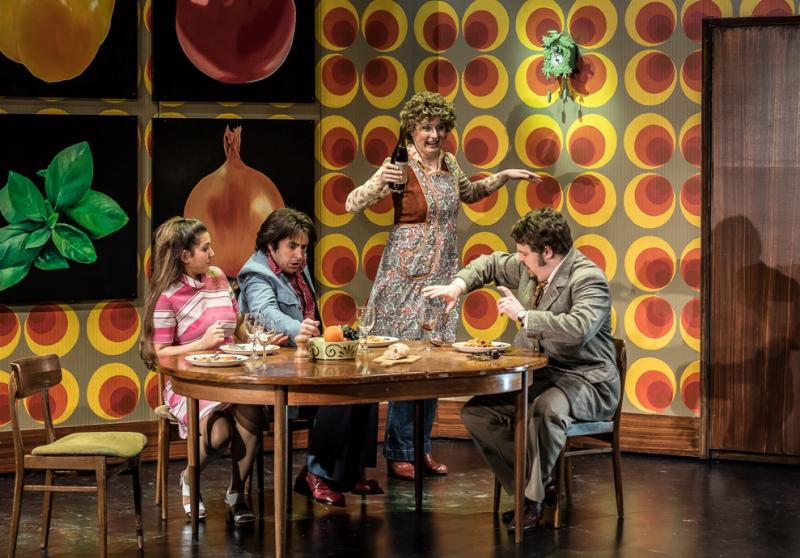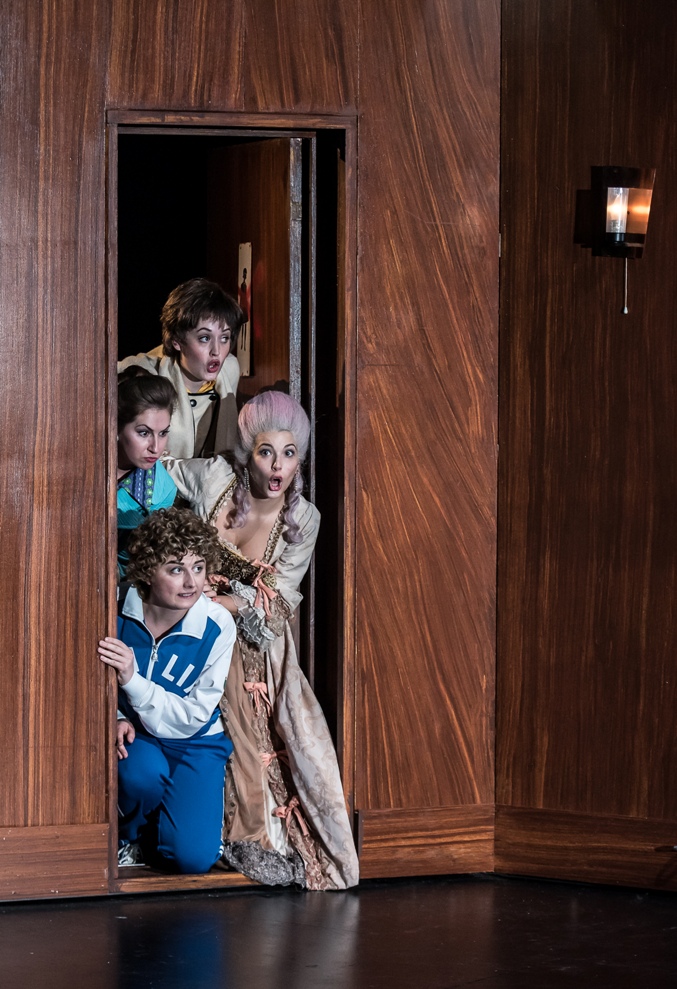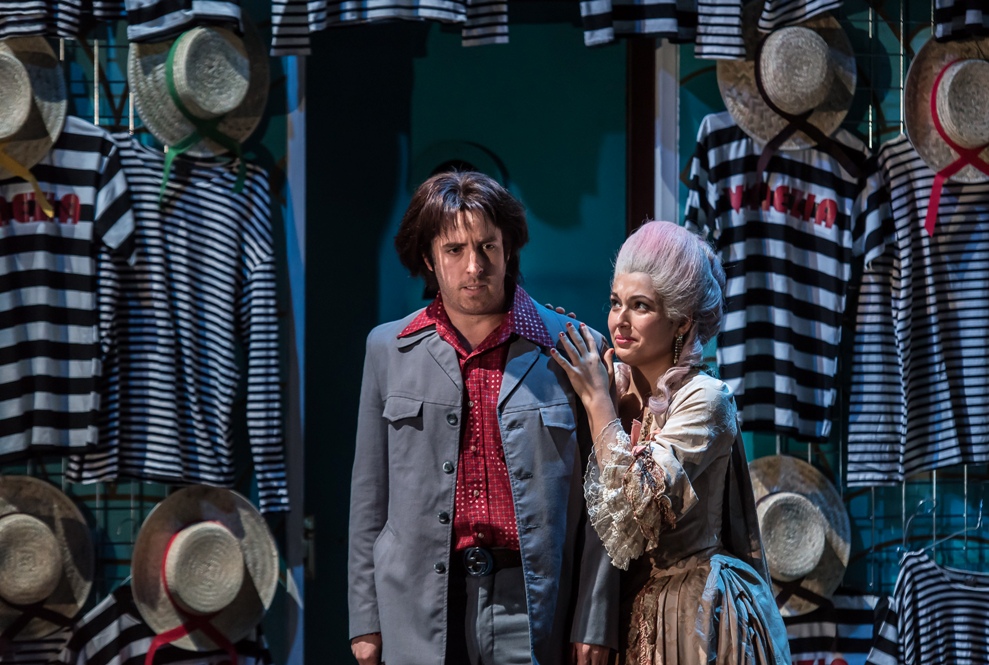Le Donne Curiose, Guildhall School | reviews, news & interviews
Le Donne Curiose, Guildhall School
Le Donne Curiose, Guildhall School
Youthful charm and a witty production keep Wolf-Ferrari's prolix comedy afloat

Scintillating gems scattered rather thinly through long-winded operas: that superficial impression of Ermanno Wolf-Ferrari’s often delectable music isn’t going to be changed greatly by seeing his first success of 1903, Le donne curiose (“Nosy Women”, perhaps, or, if you want a better English title “The Merry Men of Venice”).
Perhaps a music college’s first duty to budding opera singers is to make them feel, or seem, comfortable on stage; their whole lives up to that point have been about studying music, not drama. Past student productions have pointed up the fact that if the performers aren’t relaxed enough not to overdo it, certainly in comedy, the audience won’t go with them. Last night, in a cast with a few first-rate replacements for Monday’s team A, director Stephen Barlow hit the mark throughout, making of the nine principals of uneven vocal talent a true ensemble. In this he was vibrantly assisted by Yannis Thavoris’s 1970s designs (did anyone else of my age have a bedroom entirely in orange?). The malleable set offers one remarkable coup, a swivel from club entrance to club proper, the sort of thing that would get Met audiences applauding. The gags, not least Arlecchino's fart to two bassoons and the threat of kicking a football into the audience, are always neatly timed to the music.
 Barlow's set-up is charming and funny. The first two-thirds of Wolf-Ferrari’s delightful Overture are accompanied by tourists buying carnival masks, postcards and gondoliers’ outfits from a Venetian shop while men furtively go through the door at the back and suspicious women try to see what’s going on. Then we have the film titles for an Italian sitcom, its stars grinning at the camera. The dramatis personae are assorted businessmen and their aides, and four women – two wives, a pert daughter and a mezzo servant (pictured left from top: Bethan Langford, Elizabeth Karanyi, Nicola Said and Katarzyna Balejko). The line-up of Verdi’s Falstaff, in short, without the main character – though one of the evening’s two most striking vocal stars, and certainly the most charismatic, bass-baritone Milan Sijanov as Arlecchino, could take on that role right now.
Barlow's set-up is charming and funny. The first two-thirds of Wolf-Ferrari’s delightful Overture are accompanied by tourists buying carnival masks, postcards and gondoliers’ outfits from a Venetian shop while men furtively go through the door at the back and suspicious women try to see what’s going on. Then we have the film titles for an Italian sitcom, its stars grinning at the camera. The dramatis personae are assorted businessmen and their aides, and four women – two wives, a pert daughter and a mezzo servant (pictured left from top: Bethan Langford, Elizabeth Karanyi, Nicola Said and Katarzyna Balejko). The line-up of Verdi’s Falstaff, in short, without the main character – though one of the evening’s two most striking vocal stars, and certainly the most charismatic, bass-baritone Milan Sijanov as Arlecchino, could take on that role right now.
The patter and parrying of Verdi’s miraculous last score are emulated, though not alas the pith; Wolf-Ferrari’s own dimension is an early neoclassicism pipping his fellow Italian-German Busoni to the post, well in advance of Strauss’s Ariadne auf Naxos and Stravinsky’s Pulcinella. It could have done with more spring and lightness of touch from Mark Shanahan in the pit, though he did get the Guildhall Orchestra to convey the atmosphere and romanticism of Act (here “Episode”) Three’s night in Venice. Goldoni’s 18th century inclusion of characters from the commedia dell’arte has to do without the original improvisation, but it’s fun to catch their Venetian dialect – and it’s a joy to hear well-projected and clearly well-understood Italian between two ENO operas doggedly in English (Puccini’s La Bohème and Verdi’s The Force of Destiny, opening on Monday). Language coach Matteo Dalle Fratte has done excellent work here.
 Nothing much happens: the men meet to eat pizza and to celebrate football, fast cars and amicizia (“friendship”); the curiosità of the women leads them to imagine floozies, occult dabbling and buried treasure. It takes them an awfully long time to see what’s through the keyhole, but most of that time – at least until the later stages of the last act – is beguilingly spent. Do the women get to join the club at the end? Of course not, but then this version is set in 1970s Italy, and to judge from RAI now, feminism still doesn't have that much of a hold there.
Nothing much happens: the men meet to eat pizza and to celebrate football, fast cars and amicizia (“friendship”); the curiosità of the women leads them to imagine floozies, occult dabbling and buried treasure. It takes them an awfully long time to see what’s through the keyhole, but most of that time – at least until the later stages of the last act – is beguilingly spent. Do the women get to join the club at the end? Of course not, but then this version is set in 1970s Italy, and to judge from RAI now, feminism still doesn't have that much of a hold there.
It’s frustrating that Wolf-Ferrari refuses to settle on a proper set-piece or a musical highlilght in “Episode” One, but the second opens out to a wonderful ensemble around the spaghetti lunch in Eleonora’s kitchen, Wolf-Ferrari’s harmonic sideslips adding piquancy, and a very pretty duet for the young lovers. Vocally, second-cast tenor Elgan Thomas (pictured above with Nicola Said) steals the show here: he’s a fully-fledged tenore di grazia who can both grandstand, at least as much as the composer lets him, and sing sweet, soft nothings as girlfriend Rosaura (Nicola Said) hands him the lunchtime plates to dry.
Of the women, Bethan Langford as chief housewife shows the most promise, but that’s almost irrelevant when they all work so well as an ensemble. There are other promising baritones among the men, whose characters aren’t so fully-fledged. Although it only has one chorus of even less consequence than the ones in Mozart’s Così fan tutte, Le donne curiose is otherwise the perfect opera for student teamwork. Next, please, if Glyndebourne won't do it, a double bill of Busoni’s Arlecchino and Turandot.
Next page: listen to Toscanini conduct the Overture to Le donne curioseToscanini in 1947 conducting the Overture to Le donne curiose
Add comment
The future of Arts Journalism
You can stop theartsdesk.com closing!
We urgently need financing to survive. Our fundraising drive has thus far raised £33,000 but we need to reach £100,000 or we will be forced to close. Please contribute here: https://gofund.me/c3f6033d
And if you can forward this information to anyone who might assist, we’d be grateful.

Subscribe to theartsdesk.com
Thank you for continuing to read our work on theartsdesk.com. For unlimited access to every article in its entirety, including our archive of more than 15,000 pieces, we're asking for £5 per month or £40 per year. We feel it's a very good deal, and hope you do too.
To take a subscription now simply click here.
And if you're looking for that extra gift for a friend or family member, why not treat them to a theartsdesk.com gift subscription?
more Opera
 Help to give theartsdesk a future!
Support our GoFundMe appeal
Help to give theartsdesk a future!
Support our GoFundMe appeal
 Peter Grimes, Welsh National Opera review - febrile energy and rage
In every sense a tour de force
Peter Grimes, Welsh National Opera review - febrile energy and rage
In every sense a tour de force
 Owen Wingrave, RNCM, Manchester review - battle of a pacifist
Orpha Phelan brings on the big guns for Britten’s charge against war
Owen Wingrave, RNCM, Manchester review - battle of a pacifist
Orpha Phelan brings on the big guns for Britten’s charge against war
 Tales of Apollo and Hercules, London Handel Festival review - compelling elements, but a failed experiment
Conceptually the two cantatas just don't work together
Tales of Apollo and Hercules, London Handel Festival review - compelling elements, but a failed experiment
Conceptually the two cantatas just don't work together
 La finta giardiniera, The Mozartists, Cadogan Hall review - blooms in the wild garden
Mozart's rambling early opera can still smell sweet
La finta giardiniera, The Mozartists, Cadogan Hall review - blooms in the wild garden
Mozart's rambling early opera can still smell sweet
 Der fliegende Holländer, Irish National Opera review - sailing to nowhere
Plenty of strong singing and playing, but the staging is static or inept
Der fliegende Holländer, Irish National Opera review - sailing to nowhere
Plenty of strong singing and playing, but the staging is static or inept
 Die Zauberflöte, Royal Academy of Music review - first-rate youth makes for a moving experience
The production takes time to match Mozart's depths, but gets there halfway through
Die Zauberflöte, Royal Academy of Music review - first-rate youth makes for a moving experience
The production takes time to match Mozart's depths, but gets there halfway through
 Mansfield Park, Guildhall School review - fun when frothy, chugging in romantic entanglements
Jonathan Dove’s strip-cartoon Jane Austen works well as a showcase for students
Mansfield Park, Guildhall School review - fun when frothy, chugging in romantic entanglements
Jonathan Dove’s strip-cartoon Jane Austen works well as a showcase for students
 Uprising, Glyndebourne review - didactic community opera superbly performed
Jonathan Dove and April De Angelis go for the obvious, but this is still a rewarding project
Uprising, Glyndebourne review - didactic community opera superbly performed
Jonathan Dove and April De Angelis go for the obvious, but this is still a rewarding project
 Fledermaus, Irish National Opera review - sex, please, we're Viennese/American/Russian/Irish
Vivacious company makes the party buzz, does what it can around it
Fledermaus, Irish National Opera review - sex, please, we're Viennese/American/Russian/Irish
Vivacious company makes the party buzz, does what it can around it
 The Capulets and the Montagues, English Touring Opera review - the wise guys are singing like canaries
There's a bel canto feast when Bellini joins the Mob
The Capulets and the Montagues, English Touring Opera review - the wise guys are singing like canaries
There's a bel canto feast when Bellini joins the Mob
 Mary, Queen of Scots, English National Opera review - heroic effort for an overcooked history lesson
Heidi Stober delivers as beleaguered regent, but Thea Musgrave's opera is limiting
Mary, Queen of Scots, English National Opera review - heroic effort for an overcooked history lesson
Heidi Stober delivers as beleaguered regent, but Thea Musgrave's opera is limiting

Comments
I think the author of the
Thanks for the correction,
Thanks for the correction, now made in the text. Easily done, perhaps, but important to get it right.